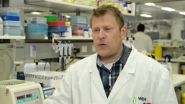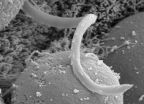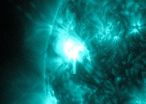(Press-News.org) Certain influenza strains are highly virulent—they cause more serious disease and kill more people. Some of the damage is caused by the stronger immune response such strains elicit, especially in the lung. A study published on May 8th in PLOS Pathogens identifies SOCS4 as a key regulator of the immune response against influenza virus.
Lukasz Kedzierski, Sandra Nicholson, and colleagues from the Walter and Eliza Hall Institute of Medical Research and the University of Melbourne, Australia, studied mice with a mutation in the Socs4 gene, a member of a gene family whose other members are known to be involved in regulating immune responses.
To investigate the role of the SOCS4 protein (the product of the Socs4 gene), the researchers first tested how the mutant mice responded to infection with a virulent influenza strain. Compared with normal mice, the mutants were more sensitive to the virus; they got much sicker and many more died. When the researchers used a weaker virus, the Socs4 mutants survived but again showed more severe symptoms than mice with intact SOCS4.
When the researchers analyzed the immune response in the Socs4 mutants they found that the mutant mice responded to influenza virus with production of abnormally high levels of cytokines and chemokines--both small molecules that promote inflammation. The observed response resembled the so-called "cytokine storm" situation that is thought to cause the lung tissue damage associated with virulent influenza strains.
In addition to the aberrant cytokine production, the mutant mice also appeared defective in mobilization of virus-specific killer T cells to the lungs. Presumably as a result of the latter problem, the mutants needed more time than their normal counterparts to clear the virus from their lungs and fully recover.
According to the researchers, this first description of SOCS4-deficient mice "suggests that SOCS4 will play an important role in immune regulation during infection."
INFORMATION:
In your coverage please provide this link to the freely available paper:
http://dx.plos.org/10.1371/journal.ppat.1004134 (Link goes live upon article publication)
Contact:
Lukasz Kedzierski
e-mail: kedzierski@wehi.edu.au
phone: +61-39-3452555
Sandra Nicholson
e-mail: snicholson@wehi.edu.au
phone: +61-39-3452555
Authors and Affiliations:
Lukasz Kedzierski, Walter and Eliza Hall Institute of Medical Research, Australia; The University of Melbourne, Australia
Edmond M. Linossi, Walter and Eliza Hall Institute of Medical Research, Australia; The University of Melbourne, Australia
Tatiana B. Kolesnik, Walter and Eliza Hall Institute of Medical Research, Australia; The University of Melbourne, Australia
E. Bridie Day, The University of Melbourne, Australia
Nicola L. Bird, The University of Melbourne, Australia
Benjamin T. Kile, Walter and Eliza Hall Institute of Medical Research, Australia; The University of Melbourne, Australia
Gabrielle T. Belz, Walter and Eliza Hall Institute of Medical Research, Australia; The University of Melbourne, Australia
Donald Metcalf, Walter and Eliza Hall Institute of Medical Research, Australia; The University of Melbourne, Australia,
Nicos A. Nicola, Walter and Eliza Hall Institute of Medical Research, Australia; The University of Melbourne, Australia
Katherine Kedzierska, The University of Melbourne, Australia
Sandra E. Nicholson, Walter and Eliza Hall Institute of Medical Research, Australia; The University of Melbourne, Australia
Funding: This work was supported in part by the National Health and Medical Research Council (NHMRC), Australia (Program grant #487922, Project grant #1023559), as well as an NHMRC IRIISS grant 361646 and a Victorian State Government Operational Infrastructure Scheme grant. KK is a recipient of an NHMRC CDA2 Fellowship, SEN, BTK and NAN are supported by NHMRC fellowships, GTB is a recipient of an Australian Research Council Fellowship, BTK is supported by a fellowship from the Sylvia and Charles Viertel Foundation, and EML is the recipient of an Australian Postgraduate Award. This work was also supported in part by the National Institutes of Health (RO1 CA22556-26). The funders had no role in study design, data collection and analysis, decision to publish, or preparation of the manuscript.
Competing Interests: The authors have declared that no competing interests exist.
Citation: Kedzierski L, Linossi EM, Kolesnik TB, Day EB, Bird NL, et al. (2014) Suppressor of Cytokine Signaling 4 (SOCS4) Protects against Severe Cytokine Storm and Enhances Viral Clearance during Influenza Infection. PLoS Pathog 10(5): e1004134. doi:10.1371/journal.ppat.1004134
SOCS4 prevents a cytokine storm and helps to clear influenza virus from the lung
2014-05-09
ELSE PRESS RELEASES FROM THIS DATE:
An extra doctor visit may help prevent rehospitalization of kidney failure patients
2014-05-09
Washington, DC (May 8, 2014) — More frequent face-to-face physician visits in the month following hospital discharge may help reduce a kidney failure patient's chances of needing to be sent back to the hospital. That's the conclusion of a study appearing in an upcoming issue of the Journal of the American Society of Nephrology (JASN). The study also found that closer outpatient monitoring of kidney failure patients following hospital discharge could cut health care costs significantly.
A major goal of health policy reform has been to reduce hospital readmissions within ...
Neurovance's EB-1020 SR for adult ADHD shows stimulant-like efficacy in Phase 2a trial
2014-05-09
Neurovance, Inc. today announced complete results from its phase 2a pilot study of EB-1020 SR, a non-stimulant, in adult male patients with all subtypes of ADHD (attention deficit hyperactivity disorder). EB-1020 SR is a norepinephrine- and dopamine-preferring triple reuptake inhibitor. The data showed a statistically significant improvement in ADHD symptoms on the ADHD-Rating Scale-IV (ADHD-RS-IV), the primary outcome measure, in a range similar to that reported in previously published trials with stimulants. EB-1020 SR appears to be well tolerated at the doses studied. ...
Ending the perfect storm: Protein key to beating flu pandemics
2014-05-09
VIDEO:
A protein called SOCS4 has been shown to act as a handbrake on the immune system's runaway reaction to flu infection, providing a possible means of minimising the impact of...
Click here for more information.
A protein called SOCS4 has been shown to act as a handbrake on the immune system's runaway reaction to flu infection, providing a possible means of minimising the impact of flu pandemics.
Scientists from Melbourne's Walter and Eliza Hall Institute have found that ...
Lethal parasite evolved from pond scum
2014-05-09
A genomic investigation by University of British Columbia researchers has revealed that a lethal parasite infecting a wide range of insects actually originated from pond scum, but has completely shed its green past on its evolutionary journey.
A team led by UBC Botany Prof. Patrick Keeling sequenced the genome of Helicosporidium – an intracellular parasite that can kill juvenile blackflies, caterpillars, beetles and mosquitoes – and found it evolved from algae like another notorious pathogen: malaria.
Keeling and colleagues had previously reported that malaria shared ...
Eating more fruits, vegetables may cut stroke risk worldwide
2014-05-08
Eating more fruits and vegetables may reduce the risk of stroke worldwide, according to new research in the American Heart Association's journal Stroke.
Researchers conducted a meta-analysis of 20 studies published over the last 19 years to assess the effects of fruit and vegetable consumption on risk of stroke globally. The combined studies involved 760,629 men and women who had 16,981 strokes.
Stroke risk decreased by 32 percent with every 200 grams of fruit consumed each day and 11 percent with every 200 grams of vegetables consumed each day.
"Improving diet and lifestyle ...
Common test used on heart patients who need defibrillator implants unnecessary: Study
2014-05-08
Hamilton, ON (May 8, 2014) – New research from McMaster University suggests that a commonly performed test during certain types of heart surgery is not helpful and possibly harmful.
The testing procedure, known as defibrillator testing (DT), is commonly used on people who require implantable cardioverter-defibrillators (ICDs) to prevent sudden cardiac death. It involves putting the patient into cardiac arrest to determine if the defibrillator can first recognize, then successfully shock the patient back into a normal heart rhythm. It requires the use of general anesthesia ...
Study confirms mitochondrial deficits in children with autism
2014-05-08
(SACRAMENTO, Calif.) — Children with autism experience deficits in a type of immune cell that protects the body from infection. Called granulocytes, the cells exhibit one-third the capacity to fight infection and protect the body from invasion compared with the same cells in children who are developing normally.
The cells, which circulate in the bloodstream, are less able to deliver crucial infection-fighting oxidative responses to combat invading pathogens because of dysfunction in their tiny energy-generating organelles, the mitochondria.
The study is published ...
Mid-level solar flare erupts from the sun
2014-05-08
The sun emitted a mid-level solar flare, peaking at 6:07 a.m. EDT on May 8, 2014, and NASA's Solar Dynamics Observatory, or SDO, captured images of it. Solar flares are powerful bursts of radiation. Harmful radiation from a flare cannot pass through Earth's atmosphere to physically affect humans on the ground, however -- when intense enough -- they can disturb the atmosphere in the layer where GPS and communications signals travel.
To see how this event may impact Earth, please visit NOAA's Space Weather Prediction Center at http://spaceweather.gov, the U.S. government's ...
JCI online ahead of print table of contents for May 8, 2014
2014-05-08
Leptin-dependent regulation of reproduction
Individuals that lack the adipose-derived hormone leptin fail to complete puberty and are infertile. Leptin-deficient mice recapitulate human phenotypes; however, it is not clear how leptin and leptin signaling impact the reproductive axis. In this issue of the Journal of Clinical Investigation, Vincent Prevot and colleagues at INSERM U837 evaluated leptin deficient animals and determined that leptin acts directly on neurons in the preoptic region of the hypothalamus that synthesize nitric oxide to regulate peripheral levels ...
Regenerating plastic grows back after damage
2014-05-08
CHAMPAIGN, Ill. — Looking at a smooth sheet of plastic in one University of Illinois laboratory, no one would guess that an impact had recently blasted a hole through it.
Illinois researchers have developed materials that not only heal, but regenerate. Until now, self-repairing materials could only bond tiny microscopic cracks. The new regenerating materials fill in large cracks and holes by regrowing material.
Led by professor Scott White, the research team comprises professors Jeffry S. Moore and Nancy Sottos and graduate students Brett Krull, Windy Santa Cruz and ...



